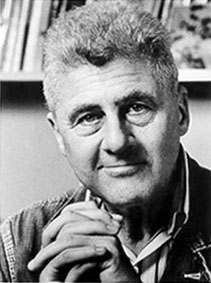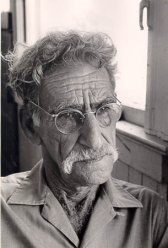What used to be called the Twentieth-Century Literature Conference but which is now known as The Louisville Conference on Literature & Culture Since 1990 is coming up later this month, and will include a panel organized by Daniel Morris on “Historical Contingencies and Jewish Modernism.” Dan will be presenting on Marjorie Perloff’s Vienna Paradox, Merle Bachman will be discussing literary cafés and Yiddish poets in New York, and yours truly will be addressing the subject of Charles Reznikoff and biblical prophecy. This is a rather long paper I wrote several years ago for a guest appearance at UNLV, and the time has come for me to whittle it down to the conventional 20-minute length to which all presenters must promise to adhere, lest they be dragged bodily from the podium in utter humiliation. Since part of the paper involves a quick introduction to Reznikoff (at UNLV, I think maybe three people in an audience of about fifty had even heard of him), I can probably get to the main argument without too much trouble, though I also may have to dispense with discussions of some of my favorite Rezi poems, like “Samuel” and the breathtaking piece originally called “A Compassionate People,” which opens Inscriptions: 1944-1956 (“Where is that mountain of which we read in the Bible…”).
In the light of my poetry and my present criticism (I’ve been writing a book for years now on what I call, for lack of a better term, religious revisionism in postmodern serial poems), my Reznikoff paper is still intriguing to me because of a passage I discovered in Abraham Joshua Heschel’s monumental study’s The Prophets. Heschel devotes a chapter of his book to the relation between prophetic and poetic inspiration, and I apply his comparison to Reznikoff. This proves useful enough: I conclude that Reznikoff’s poetry does not meet the Jewish criteria for prophecy but is ironically powered by his deep awareness of an absence of the prophetic vocation. Having written the essay, I remain haunted by Heschel’s analysis: “The poet’s inspiration seems . . . to be a subjectless experience, a condition in which no personal agent is apprehended. The source he is exposed to is unknown, devoid of personal identity, and his own role is one of passive receptivity, of being a receptacle, a mere object.” Heschel mentions the impersonality of poetic inspiration, and one is reminded not only of T. S. Eliot and his idea of an impersonal tradition moving through the poet, but of Yeats and his wife receiving messages from the spirits, and of Jack Spicer, who insists that poems come from an unknowable outside, from the “Martians.” The poem, coming from beyond, is seeking itself through the poet; it is the form becoming itself that is primary. On the other hand, the prophet is concerned primarily with the message, a message, Heschel reminds us, that comes from God: “In prophetic inspiration . . . the knowledge and presence of Him who imparts the message is the central, staggering fact of awareness. There is the certainty of having experience the impingement of a personal Being, of another I; not an idea coming from nowhere or a nameless source, but always a communication reaching him from the most powerful Subject of all.”
I appreciate how straightforward Heschel’s distinction is, though of course, I also realize that this is just the tip of the iceberg. In English poetry alone, the distinction is already blurred in the Renaissance with figures like Spenser, becomes much more complex with Milton, and simply explodes with the Romantics. In the figures of Whitman and Dickinson, American poetry may be said to have its origins in the problematic of prophecy. Reznikoff, steeped in both Judaism and the Anglo-American poetic tradition, worked out a unique and (to my mind) very unstable “solution” to the problem, which must partly determine any further discussions of his poetry. This instability or volatility is one of the qualities I find so important and moving in Reznikoff.
Furthermore, I continue to worry over the problem in regard to contemporary poetry at a time when many poets, with a tremendous variety of ethnic and religious backgrounds and experiences, are raising the issue of “spirit” in their work. “Whose spirit is this?” we might ask, echoing Stevens. Given his prophetic faith, Heschel speaks for “the impingement of a personal Being, of another I…the most powerful Subject of all.” I suspect that this won’t work for most poets, even the relatively rare ones who consider themselves devout in some orthodox way. As for me, I’m ambivalent about Heschel’s formulation for poetic inspiration (“a subjectless experience, a condition in which no personal agent is apprehended…”) though it also speaks very strongly to many instances of my own composition (or is that dictation?). What we can call modern poetry’s “Jewish Question” (cf. Allen Grossman’s great essay “Jewish Poetry Considered as a Theophoric Project”) complicates matters even more.
Oh well. I just write what the voices in my head tell me to write…


